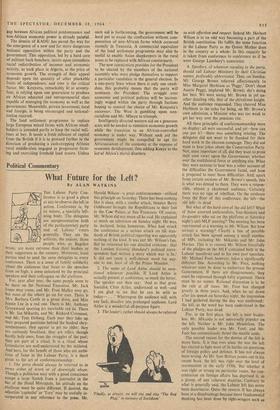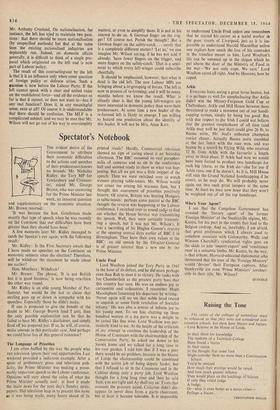Political Commentary
What Future for the Left?
By ALAN WATKINS For, year after year, the same people seem to be there on the National Executive. Mr. Jack Jones may come, and Mr. Fred Mulley may go, but most of the others go on for ever. There is Mrs. Barbara Castle in a green dress, and Miss Jennie Lee in a red one There is Mr. Anthony Greenwood sporting his inevitable red tie. There is Mr. Ian Mikardo, and Mr. Richard Crossman, and Mr. Tom Driberg. Each year they take up their prepared positions behind the banked chry- santhemums; they appear to get no older; they are curiously fossilised; they are relics, though hardly holy ones, from the struggles of the past; they are part of a ritual. It is a ritual whose formularies are well-understood by the initiated. And here, for the benefit of those who are ambi- tious of fame in the Labour Party, is a short guide to the art of conferencemanship: 1. The press should always be referred to in terms either of scorn or, of downright abuse. Though a politician may with a good conscience accept a large Scotch from a journalist in the bar of the Hotel Metropole, his attitude on the platform must be quite different. If desired, the adjective 'capitalist' or 'Tory' may be usefully in- corporated in any reference to the press. Mr.
Harold Wilson—a great conferenceman—utilised this principle on Saturday. There has been nothing like it since, with a similar attack, Senator Barry Goldwater brought the Republicans to their feet in the Cow Palace at San Francisco. Of course, Mr. Wilson did not mean all he said. He explained as much on television on Sunday night. He was, he declared, being humorous. What had struck the conference as a serious attack on the stan- dards of British political reporting was apparently nothing of the kind. It was just Mr. Wilson's fun. But he reiterated his one detailed criticism: that the London Evening Standard's political corre- spondent had written a story which was 'a lie.' It did not seem a well-chosen word for any- one , to use, least of all the Prime Minister.
2. The name of Lord Attlee should be men- tioned whenever possible. If Lord Attlee is actually present at conference, so much the better. The speaker can then say: 'And as that great Socialist, Clem Attlee, understood so well—and I am glad to see that he can be with us today— . . .' Whereupon the audience will, with any luck, dissolve into prolonged applause. Lord Attlee is a wonderful all-purpose figure.
3. The leader's father should always be referred
'Finally, as always, we will rise and sing "The Red Flag," in memory of Socialism.'
to with affection and respect. Indeed Mr. Herbert Wilson is in an odd way becoming a part of the British constitution. He fulfils the same function in the Labour Party as the Queen Mother does in the country as a whole. In this capacity he is taken from conference to conference as if he were George Lansbury's conscience.
4. Speakers, of whatever standing in the party, should call Labour Ministers by their Christian names, preferably abbreviated. Thus, on Sunday, Mr. George Brown referred affectionately to Miss Margaret Herbison as 'Peggy.' Don't shoot Auntie Peggy, implored Mr. Brown; she's doing her best. We were seeing Mr. Brown in yet an- other dazzling role, that of the chivalrous knight. And the audience responded. They cheered Miss Herbison to the echo for being, on Mr. Brown's own admission, a Minister who was too weak to get her way over the pensions rise.
All these principles of conferencemanship were on display; all were successful; and yet—how can one put it?—there was something missing. The delegates did not want to be thanked for their hard work in the election campaign. They did not want to hear jokes about the Conservative Party. Nor, most important of all, did they want to press their own views upon the Government, whether over the multilateral force or anything else. What they were anxious to hear was a sober account of the difficulties the Government faced, and how it proposed to meet those difficulties. And, apart from certain sections of Mr. Brown's speech, this is what was denied to them. They were a respon- sible, almost a chastened audience, Certainly there was no sign of rebellion. On the evidence from the floor of this conference, the left—the old left—is dead.
But what of the hard core of the old left? What of those assorted unilateralists, free-thinkers and do-gooders who sat on the platform at Saturday night's anti-MLF meeting? The meeting has been represented as a warning to Mr. Wilson. But how serious a warning? Clearly a line of possible attack has been agreed among a small number of MPs, including Mr. Mikardo and Mr. John Horner. This is to remind Mr. Wilson forcefully of the pledges on the MLF contained both in the Labour manifesto and in his own past speeches. Mr. Michael Foot, however, takes a significantly different line. According to Mr. Foot, nothing whatever must be done to embarrass the present Government. If there are disagreements, they must be expressed through lofty argument. There must be no scenes. Rational discussion is to be the rule at all times. Mr. Foot has changed greatly in three years. And, when he sat down after his speech on Saturday night, the impression I had gathered during the day was confirmed : the left, as the word has been understood in the Labour Party, was dead.
For, in the first place, the left is now leader- less. Mr. Mikardo is not universally popular on the left. Neither is Mr. John Mendelson. The only possible leader was Mr. Foot; and Mr. Foot has ostentatiously thrust the mantle aside.
The second reason for the demise of the left is more basic. It is that ever since the war the left has elected to fight most of its battles on questions of foreign policy and defence. It has not always been wrong. As Mr. Sam Brittan points out in his recent book, the left was right over the level of rearmament in the early 1950s. But whether it was right or wrong on particular issues, the con- centration on foreign affairs has deprived it, as a group, of any coherent doctrine. Contrary to what is generally said, the Labour left has never been doctrinaire. Quite the reverse. It has always been at a disadvantage because more fundamental thinking has been done by right-wingers such as Mr. Anthony Crosland. On nationalisation, for instance, the left has tied to maintain two posi- tions: that there should be more nationalisation (by unspecified methods) but that at the same time the existing nationalised industries are deplorably run. Indeed, on domestic affairs generally, it is difficult to think of a single pro- posal which originated on the left and is now part of Labour policy.
The result of this contracting-out by the left is that it is an influence only when some question of foreign policy or defence arises. Such a lineation is now before the Labour Party. If the left cannot speak with a clear and united voice on the multilateral force—and all the evidence so far is that it cannot, or does not want to—has it any real function? Does it, in any meaningful sense, exist at all? Of course it is understandable that there should be confusion. The MLF is a complicated subject; and we may be sure that Mr. Wilson will not go out of his way to oversimplify
matters, or even to simplify them. It is not in his interest to do so. A German finger on the trig- ger? Of course not. Perish the thought! .But a German finger on the safety-catch . surely that is a completely different matter? `Let us,' we can imagine Mr. Wilson saying, if he has not said it already, 'have fewer fingers on the trigger, and more fingers on the safety-catch.' That is a senti- ment to which every left-winger could subscribe cheerfully.
It should be emphasised, however, that what is dead is the old left. The new Labour MPs are bringing about a re-grouping of forces. The left is now in process of re-forming; and it will be,many months before we know the result. What is already clear is that the young left-wingers are more interested in domestic policy than were their predecessors. At some time a new leader of the re-formed left is likely to emerge. I am willing to hazard one prediction about the identity of this leader. It will not be Mrs. Anne Kerr.





























 Previous page
Previous page